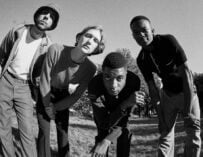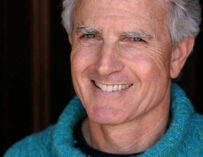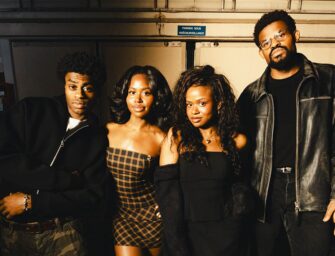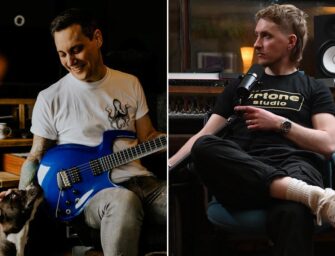
Jussi (right): “I had never sung a single note in my life till just before GTT formed and I hated my voice.” Photo: Al Overdrive
The masters of pyrotechnic electro noise break down their unique way of working and the benefits of being a duo
When the single Borrowed Lies landed On The Stereo back in December 2018, it immediately piqued our interest (and gave our ears a good old bashing). Such was our enjoyment of the track, we were determined to find out a little more about those responsible for this, “scuzzy call to arms.”
Formed in 2009, the London-based duo of Jussi Brightmore and Tom Fug have recently received their third album as Gum Takes Tooth. Arrow builds on the work that the pair laid down on previous records, Silent Cenotaph and Mirrors Fold. Their sound, built from the drums up, combines electronically manipulated beats with distorted sounds and vocals, packing a devastating punch which you’d think was created by an entire army of battle-hardened sound warriors. There’s also plenty of substance beneath the noise; Arrow deals with themes of fatherhood, class struggle and the difficulties of living in Britain’s capital city during these uncertain times.
With plenty of questions in mind, we recently tracked down the pair to discuss their unique approach to songwriting…
Are there specific strengths that come from being a duo?
Jussi Brightmore: “Absolutely. I like being able to bat ideas around so quickly, having each other to riff off but not getting bogged down with having to put everything through a committee. We sometimes don’t agree with each other but that’s fine – on the whole, it just means we don’t do whatever’s contentious and get on with it.”
Do you have a set way of starting a song?
Jussi: “I think it’s worth mentioning that we don’t write “songs” in the traditional sense of, ‘I’ve got these lyrics,’ ‘I’ve got these chords/this riff/whatever,’ and, ‘Now I’ve got an idea for an arrangement.’ The way we’ve been working since the beginning is quite unusual in that, through the designed-in technical necessity of our self-built setup, we have pretty much always had to play at the same time to create any sound at all.
“Tom’s drums trigger the electronics, I manipulate them live, playing dials and buttons to mould sounds and create different note sequences without any keyboard input device or scale as a reference point.
“In the usual sequence of things, Tom will just start playing an acoustic drum rhythm and I’ll start building sounds with that rhythm. Often this will stop, we’ll junk the first attempt then start again with either or both of us proposing refinements or new rhythm ideas that is a response to the first. Definitely both of us equally throw in suggestions. It’s always exploratory. Even if we start with a defined idea of what we want to do, it pretty much invariably turns into something utterly different quite quickly.”
Tom Fug: “Generally all our songs come out of jamming. Although one of us might have an idea of a type of sound or rhythm we are after, more often than not, the result is nothing like the initial idea. We definitely don’t have a strict approach to songwriting – the only constraints we have are technical ones. Due to the nature of our setup, it’s difficult to make any sound without both of us being present.”
What is the impact of building songs from the drums up?
Tom: “For me as a drummer, it’s often a very different way to think about drum rhythms. In another band, I could just play quite naturally along to what the rest of the band are doing. But as the drums dictate the timing of the synths, I constantly need to consider what the resulting “riff” is going to be when I play. This does mean I’m somewhat restricted from being too free or able to go too crazy with fills.”
How do you think your sound has evolved on Arrow?
Tom: “From the first album, which was pretty much recorded as we played live at the time, there has been more emphasis on production and additional layers when producing the albums. Often to the point where we don’t really consider whether or not we can reproduce the songs live exactly as they are on record when we develop them.”
Jussi: “As previously mentioned, we don’t create albums with any master plan, but particularly over the last two albums we’ve tried to make them effective coherent statements, even if just through track selection and particularly track sequence, which we consider totally crucial.
“For me, a big change has been slipping into the groove a bit more with writing lyrics, which was unexpected. Lyric writing is not something I’ve ever felt confident about till now. Previously I’d always try and bury the vocal as much as possible and deliberately try to turn it into another electronic instrument. There’s still a hell of a lot of that on Arrow, but not quite as much. Vocals are left just a little more human, but obviously this is totally relative to our own previous material. Previously the proposal of leaving any personality or natural expression at all in the vocals scared the shit out of me.”
Are there any new technological innovations that you have discovered/created this time?
Tom: “I have actually been completely redesigning our setup during the production of Arrow. However, it’s not made its way onto that album. It will have to be for the next one, as it’s still in development. Our main bit of kit is a piece of software called Reaktor by Native Instruments. It’s essentially a bit of software that allows us to create our own virtual synthesizers, effects and performance environment. I have a bit of a love/hate relationship with this, as it has its quirks and can be quite frustrating, but at the same time it allows us to create something that is unique to us.”

Gum Takes Tooth’s Jussi (right): “I don’t think any artist should feel motivated by anyone else’s response.” Photo: Al Overdrive
With such a “big” sound, how do you ensure that your lyrical message is heard? Is that even important?
Jussi: “This is a good point and, to be honest, I’ve always felt inclined to deliberately bury the vocals deep in the mix. This is fundamentally to maximise the dynamic scale of the music, which is important as we always want the tracks to be holistic productions, and emphasise the sonic message over a vocally-narrated message. Interpretation by the listener is key and I hope that the total effect can act as a springboard to stimulate the listener’s own imagination.
“That said, a significant contributing factor to the extremity of this approach on previous albums has been my own lack of confidence in my vocal ability and my discomfort in writing autobiographically. I’ve treated my voice like an electric guitar – sounds like shit until you plug it in, then stomp on some way out effects to get cooking. I wanted to deliberately depersonalise my voice, for it not to be about me but instead explicitly play multiple characters. I’ve felt that this echoes our increasingly prismatic personalities as they are projected through our increasingly various digital communication channels. Our voice in social media comments is different to our voice in-person, or in emails, or on this forum or that forum.”
It sounds like this aspect of your work has been an ongoing struggle…
Jussi: “I’ve never had any understanding of how anyone else comes up with songs, particularly fitting lyrics to music. I had never sung a single note in my life till just before GTT formed and I hated my voice. But I was asked to contribute vocals in a previous band where Tom and I met. Just shouting loudly into a mic over loud music felt great and I guess every time I did it I felt I was minutely incrementally getting over my fear of singing.
“Generally, I’ve felt incredibly self-conscious when writing lyrics. Once I started thinking about doing it nothing seemed to come naturally, nothing felt honest or comfortable. For this album, to break out of this situation, I started writing in a total uncensored stream of consciousness and then rearranging them by applying a (William) Burroughs-style cut-up method to come up with lyrics. This overcame the writer’s block I was experiencing at the time, but I’ve come to hold this writing method at increasing value for other reasons. Just as the Surrealists exulted unconsidered and uncensored creativity as a way to tap into the unconscious with honesty, to uncover hidden and often uncomfortable truths in our personal and collective psyches, I found that, through automatic writing, unexpectedly defined themes would come out of the chaos. I feel like through this method I interrogate myself far more incisively than I could with any conscious attempt at lyricism. Whatever’s on my mind comes out and the semantics are inherently personal.”
The press material mentions how the album has been inspired by events in London over the last few years… How has this specifically bled into your songwriting?
Jussi: “Over the time the album took to finish I personally was going through a very difficult time, notably the stresses of becoming a dad within the temporal, financial, social and spatial pressures of London. I was naturally preoccupied with thinking about what the future will be for our daughter as far as I could speculate on it by what I perceive in the present.
“In terms of our immediate environment, the (re)development capital model that’s been changing London’s architectural fabric is filtering out its inhabitants into a narrower and narrower demographic band exerts itself firmly on our lives and the lives of those around us. The geographer Doreen Massey wrote, ‘Spatial organisation is integral to the production of social relations and power relations and not merely the result.’ More and more people are being disempowered in the capital through the rearrangement of space and the associated aspirational marketing narratives projected by the administrative bodies responsible contribute significantly.
“The administrative body, with its responsibility to social care for its citizens, colludes with developers to construct narratives which are essentially pitches for property investments. Narratives that are incongruous and excluding to many citizens. It feels like these insert gaping social voids into urban space. Appropriated narratives have always been there, but loom particularly menacingly in the broader current climate of acute populism and nationalism.”
Do you think you can hear those frustrations in the music?
Jussi: “It’s worth mentioning these themes that appeared through the lyric writing process and illustrate a totally personal mental situation as a response to a stimulus, external or otherwise, rather than any refined critique or desire to preach. I really want to avoid ever coming across as preachy. Much of the tension is a result of my feeling complicit in what I’m uncomfortable with in my environment and certainly there’s no attempt in the lyrics at my formulating answers to the questions and challenges that come up.
“Given that the lyric writing happens separately to the core of the music making, it was pleasing to find that the terse themes of many of the songs married naturally with the dark, bleak quality of much of the music on the album.”
How essential is it that you have a shared view of the world – do you discuss the themes of each track?
Jussi: “We know each other well and we have enough of a shared world view to trust each other in our motivations, so when it comes to lyrics Tom just lets me get on with it. We don’t discuss anything beforehand but I’m always happy to cut stuff out if it doesn’t pass Tom’s junk filter.”
Is it important to offer your audience moments of hope, as on The Arrow and House Built Of Fire?
Jussi: “I don’t think any artist should feel motivated by anyone else’s response. I believe that creating music is one of the few situations when the people making it should just do what they want. It’s up to the listener to decide if they connect or reject, and either response is fine. The more personal the music you create is, the more meaningful it is if you do happen to share a connection with a listener.
“We are inclined to be quite dynamic in tone over the course of an album just because it feels right to us. House Built Of Fire is an example of that, although it was quite hard to find where to put it in the track sequence of the album because it isn’t dark like most of the material. Hopefully, now it works to give a final lift from the pressure that persists through the rest of the album. How it finishes, the slow down after the sustained climax does feel like a final sigh of relief, maybe finally reaching a feeling of equanimity after the sustained tension.
“That said, a current favourite album of mine, Embodiment by Mortal Bodies, is truly morose all the way through – great!”
Lastly, what is your ambition when releasing an album?
Tom: “For us, the most important thing is that we have made an album we are proud of. Anything beyond that is a bonus really. All we can do is hope that there are other people out there who appreciate what we do. For me, the fact that we get people in different cities and countries who enjoy the music and show up to gigs, meaning we can meet nice and interesting people through our music, is the biggest benefit of being in a band.”
Jussi: “Releasing underground music on a truly independent record label means that the people who are putting your record out, just as those who are putting you on at a gig, really want to do it and because they want people to hear interesting music. It’s honest and energised and not all about numbers. When releasing an album, the most I could wish for is that those people who might be into it get an opportunity to hear it and make up their own minds. If someone digs it – good, if someone hates it – good too, just so long as they’ve made up their own minds. We make music that is unlike that which most people listen to and we don’t offer an easy ride. Do we have aspirations of world domination? Obviously, it’s nice to give other people an experience they welcome, hopefully, something that might be different to what they are used to, but we have absolutely no aspirations of mass popularity. If we created an album that no-one else liked, we wouldn’t care so long as we were happy with what we did.”
Interview: Duncan Haskell
Arrow is out now on Rocket Recordings, and for all the band’s latest news take a peek at gumtakestooth.com




































Related Articles